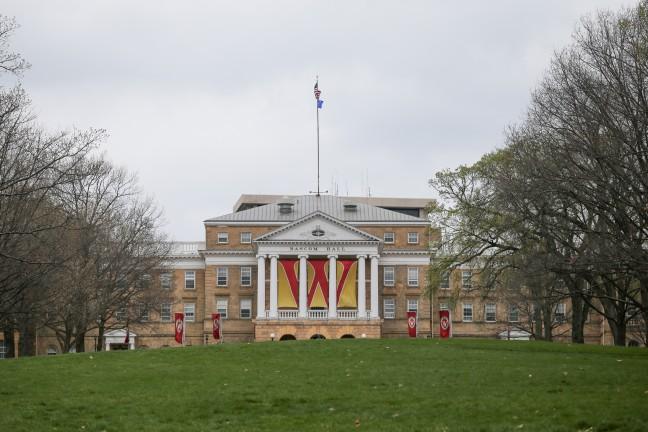In the wake of the holy month of fasting, millions of Muslims around the world are celebrating their dedication through night-long prayers and perusing the Quran. A majority of Muslims are spending their time surrounded by loving parents, grandparents, siblings and even distant cousins, but for college students like myself, we are separated from our Muslim families and loved ones.
For those who don’t know, Ramadan is an Islamic month that centers around dedication and sacrifice. Muslims are expected to fast from sunrise to sunset, usually totaling around 14-16 hours of no water or food each day until the end of the month. To no surprise, this is something that is extremely mentally, emotionally and physically exhausting.
Muslims may not be able to perform as well in physical and cognitive activities because of the toll the fast takes on their bodies.
The University of Wisconsin, like many other institutions, prides itself on its liberal ideologies, but its recent ignorance and lack of recognition of the Islamic holiday speaks volumes. The silence goes beyond the self-gratifying statements of inclusion, which are mere verbiages void of consistent action. Tragically, the university has yet to even use words to address these issues, let alone engage any progressive actions into play.
These academic institutions — like UW — are not void of harboring prejudice and perpetuating systems of oppression. One of those discriminatory behaviors that unfortunately remain proliferated within academia is Islamophobia. Islamophobia is the individual and systemic discrimination against Muslims and the Islamic faith through which systems of oppression, criminalization and ostracization against Muslims are sustained.
Most forms of discriminatory behaviors are actively scrutinized within higher education, but Islamophobia remains unobstructed, persistently ignored and normalized throughout college. To put things into context, the historic demonization of Muslims within personal and political dialogue allows for the persistence of systemic racial ascriptions of Muslims. In fact, Islamophobia is so deep-rooted that it remains invisible within daily and political discourse.
In other words, Americans and college students remain uneducated and completely detached from Islamic literature and issues whilst showing no urge to self-educate and explore such cultural and political realms.
Egyptian-American student Reem Salah is understandably frustrated with the minimal response that the university has given to Ramadan.
“There are virtually no praying spaces on campus for Muslims to practice,” Salah said. “Most professors have not recognized the month nor have they offered any accommodations for Muslim students.”
Furthermore, there is no structural support in place — like academic accommodations, extended deadlines or flexible test timings — offered to Muslim students during the month to ensure their success during the semester.
Muslims shouldn’t feel like they are supposed to pick between their faith and their education.
“It is almost as though the system is making it harder for me to be both Muslim and a college student,” Salah said. “Why am I made to believe that my religious belief is a hurdle to my academic success?”
The multiple manifestations of institutionalized Islamophobia through the lack of administrative response as well as overall campus recognition is utterly embarrassing.
My teachers asking me what Ramadan means is institutionalized Islamophobia. My classmates not knowing what Ramadan is institutionalized Islamophobia. My research lab not accommodating me is institutionalized Islamophobia.
My classmates eating in front of me and offering me alcoholic drinks is embarrassing. The sheer lack of awareness and the way in which Muslims are treated during this Islamic month is completely unacceptable.
The structural silencing and erasure of Ramadan reflect the institutional oppression of Muslims in the U.S. within the last decades. In effect, this perpetuates the invisibility of Muslims and Muslim students on campus. The lack of awareness is not only harming Muslim students but is also reflecting poorly on the university’s prestige and social climate.
We must advocate for a policy change to be placed within the university that not only creates more awareness for Muslim students during Ramadan but also offers them accommodations for testing and assignments. We must strive to create an academic space that makes knowledge and academic performance accessible to everyone.
Blatantly put, the lack of recognition of Ramadan is an embarrassment. It is an embarrassment to this institution. It is an embarrassment to higher education. It is an embarrassment to all Muslim students around the U.S. And, it’s an embarrassment to modern-age egalitarianism and progressive inclusivity.
Alongside policy changes, UW students must do better. Instead of ignoring the month, ask your Muslim friends if they are comfortable with you eating around them. Ask them if there are ways you could support them during their fast.
UW professors must do better. Reach out to your Muslim students and offer them accommodations. UW — do better.
Muslim students — do not stop advocating for your rights. Do not stay quiet. Do not be afraid to take up space. Do not let them silence you.
In order to deconstruct this system of oppression, we must all do better. It starts with each one of us.
Abdullah Marei (amarei@wisc.edu) is a junior majoring in psychology.


